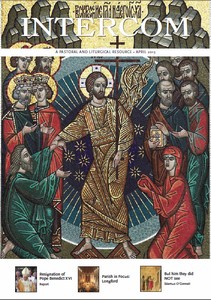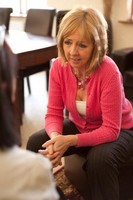 April 2013 issue
April 2013 issue
Click on link to view Intercom April contents
Editorial and Newsletter resources
Feature Article
A Pastoral response to suicide (pdf), interviews with Seamus McCabe and Joan Freeman.
A Pastoral Response to suicide
There is not a community in Ireland that hasn’t been affected by suicide. People of all ages and backgrounds, in varying circumstances, are taking the tragic decision to take their own lives. The consequences are far-reaching: families and friends experience a devastating loss, and some may even be prompted to consider suicide themselves.
The Council for Justice and Peace and the Northern Ireland Catholic Council on Social Affairs have been examining how the Catholic Church can use its resources to best effect to combat the unacceptably high levels of suicide throughout Ireland. As part of this work, Nicola Rooney, Research Coordinator, spoke to two experts working on the ground with local communities to ask what can be done at parish level to support those at risk of, or bereaved through, suicide.
Seamus McCabe is CEO of PIPS (Public Initiative for the Prevention of Suicide and Self-Harm) Newry and Mourne and Southern Area Protect Life Resource Centre Worker. Seamus spoke to us about the role of Parish Priests. 
Seamus, could you tell us about your experience working with clergy?
At PIPS Newry and Mourne we have developed strong relationships with the clergy from all churches in the local area. We recognise that churches have a major role to play in suicide prevention and in support for bereaved families. Every year we partner with local churches to organise a Christmas service for bereaved families. This is always well attended and is a great source of comfort for families at a difficult time.
A good working relationship with local clergy is crucial in enabling me to reach vulnerable people, as priests may be one of the first people they reach out to at a time of crisis. To give an example: recently I received a call from a local priest who told me that someone had just arrived at his home asking for help because he felt suicidal. The person had been self-harming and was in great distress. I was able to attend and refer the person to a service which could assist him. We put together a counselling programme for that person and he is now working towards recovery with the necessary supports in place.
Suicide prevention requires a multi-agency approach. Everyone has a part to play and Churches have a particularly important contribution to make within that framework.
What are the main challenges for parish priests in dealing with suicide in their communities?
Priests face a lot of challenges in responding to suicide, but, at the same time, they have a lot of opportunities to make a positive contribution. For a bereaved family, the local priest is often one of the first people to be called. The family will be in a very distressed state. They may not even know if the death of their loved one was as a result of suicide – they may have to wait for the verdict of the coroner – so uncertainty may be an additional complicating factor to be taken into account.
In addition, families are often uncertain what to expect from the priest in the case of suicide. The stigma attached to suicide – as sinful and criminal – is still very recent and alive for many people. Even without training, priests can make a significant contribution to healing simply by listening and responding with compassion to the spiritual and emotional needs of the family. With training and resources, however, more can be done to ease the family’s burden and reduce the risk of further suicides within that family or the wider community.
What kind of support can priests provide to bereaved families?
Firstly, it is very important to be aware of your language. Training can be very helpful here to increase understanding and sensitivity. We don’t want to add to the stigma surrounding suicide by being afraid to speak about it openly. At the same time, it is important to change the way we talk about suicide. We need to stop using the verb ‘commit’ in connection with suicide. The use of the word ‘commit’ evokes the old stigma of sin and crime and can be very hurtful for family members. Instead using a more compassionate approach when talking with families bereaved means we can engage more empathetically with them, so it is better to talk about their loved one dying by suicide, or taking their own life.
It is important to understand that bereavement through suicide entails a very particular sense of loss. In addition to the terrible shock, there is an element of ‘choice’ in death by suicide that can be very difficult for those left behind to accept.
Where families are feeling helpless, a priest who is informed about official procedures and available supports and services can be of invaluable assistance. We make information packs available to priests which explain the coroner’s process and outline the different kinds of supports that are available. If the family are ready for this, the priest can leave information packs with them with explanatory leaflets and contact numbers.
Priests need to be aware that, in the wake of a suicide, other family members and close friends are particularly at risk. There is also a danger of a contagious effect in the local community.
Finally, priests need to be aware that not all members of the family will respond in the same way. Some may be desperate for spiritual and pastoral support, while others may not be ready to engage, and in some cases may be angry at God for the loss of their loved one.
What advice would you have for priests in approaching the funeral of someone who has died by suicide?
Funerals can provide a crucial opportunity for outreach to others who may be thinking about suicide, because they bring together many of those who have been affected by the death. The needs of the bereaved family have to come first, of course, so nothing can be done without their consent. If the family have accepted that their loved one died by suicide, then the priest should talk to them about the impact of this loss on other members of the family. They should be made aware that it can be a normal reaction for others to consider suicide after losing someone they cared about in this way. With the family’s express permission, the priest could make a brief appeal in his homily for anyone who needs support, or is concerned for the wellbeing of someone else, to avail of the services on offer. It would be extremely helpful to display a poster in the Church and have information leaflets available that people could take with them.
In talking about suicide at an occasion such as a funeral, there is a careful balance to be struck. We don’t want to add to the stigma around suicide by avoiding mention of it or speaking of it in hushed tones. This stigma is a significant obstacle to people seeking help. Too many people still suffer in silence because they are afraid of being labelled as ‘mentally ill’ if they admit to having suicidal thoughts. At the same time, we have to be extremely careful not to sensationalise or glorify suicide. Young people, in particular, are highly sensitive to the impression that this may be a way to gain recognition and status among their peers. Lastly, we need to avoid normalising suicide – giving people the impression that this is somehow the logical response to difficult circumstances.
In spite of the complexity of this issue, priests, by bringing a compassionate response, together with an understanding of the issues informed by training, can make a significant contribution to healing – both for the family and the wider community.
Joan Freeman is the CEO of Pietà House, a charity established in Dublin in 2006 to help people in distress, those who have attempted suicide or self-harm or are experiencing suicidal thoughts. The organisation has since expanded and is endeavouring to provide a Pietà Service within 100 kilometres of every person in Ireland. Joan spoke to us about the Mind our Men initiative Pietà House is launching this year.
Joan, what role do you think parish communities could play in efforts to prevent suicide?
 If we are going to really address the problem of suicide in our society, then we need to be tackling this problem all together. It’s about connecting with people and supporting each other. The local parish plays a key role in this regard, because it is a vital social structure which brings together people who may otherwise be hard to reach and who might not have strong support networks of family and friends. This is particularly significant in rural communities, where isolation can be a significant causal factor in suicidal ideation, with men especially vulnerable. The Parish Priest is a key contact person, because those in distress may turn to their local priest for support and priests need to be ready to respond appropriately and provide information about relevant services.
If we are going to really address the problem of suicide in our society, then we need to be tackling this problem all together. It’s about connecting with people and supporting each other. The local parish plays a key role in this regard, because it is a vital social structure which brings together people who may otherwise be hard to reach and who might not have strong support networks of family and friends. This is particularly significant in rural communities, where isolation can be a significant causal factor in suicidal ideation, with men especially vulnerable. The Parish Priest is a key contact person, because those in distress may turn to their local priest for support and priests need to be ready to respond appropriately and provide information about relevant services.
How can our parish communities ensure they are well prepared to respond to the problem of suicide?
At Pietà House we are working to raise awareness of the value of peer support. We began with an initiative aimed at young people called Mind ur Buddy. This came about through requests from schools for talks on suicide and self-harm. We quickly realised that a much more effective strategy was to train young people to recognise how to identify signs of distress in others, and how to support them in finding the help they need. This proved to be effective not only in suicide prevention, but also in addressing other social issues, such as bullying.
Research has now shown that men are particularly vulnerable to suicide, and less likely to seek help, and so we have now adapted this model for adults with the Mind our Men initiative. This involves encouraging organisations where there is a high concentration of men to have Designated Contact Persons (DCPs). The DCPs are trained by us to identify signs of distress and offer immediate support to the person affected until they can be referred to a trained therapist. We ensure that all DCPs have a dedicated Pietà therapist supervising and supporting them in this work as well as advising and guiding them on how best to respond to the particular needs of their organisation. We have found that the peer support model is non-threatening for people and therefore increases the likelihood that they will open up about the difficulties they are facing.
We would be delighted to see Churches get involved in this initiative as we believe they have a lot to offer. Churches provide a caring and supportive environment. The members of the Church community are well placed to identify those who may be in need of support and offer assistance in a non-intrusive manner. Churches can make a vital contribution to awareness-raising and can set an example for others by encouraging training and making support and information openly available.
Who can avail of this training?
Pietà now has services throughout Ireland: Leinster (Dublin, Wicklow, Kildare); Mid-West (Limerick, Clare and North Tipperary); West (Galway, Mayo, Roscommn and Sligo); Tipperary (Offally, Kilkenny, and West Meath); South (Cork, all of Cork city and county and Waterford); South West (Kerry). Organisations can contact their nearest Pietà service to join the initiative. We will help them select a DCP and then provide support and on-going supervision for the DCP in his/her efforts to raise awareness about suicide and related issues within the organisation.
We are also keen to encourage women to come forward for training which would help them support male family members who may be in distress or considering suicide. We would hope to educate them, not only to recognise the signs and symptoms of distress, but also to know how to use the caring abilities they already have to give support to loved ones.
In addition to this Pietà House initiative, there are other forms of training which are provided by a range of agencies across the country, notably ASIST and Safe-Talk. The aim of these programs is to equip people with the basic skills to talk about suicide and respond to those who are feeling suicidal in the most helpful way possible. Anyone who is interested should use check online for their nearest training provider.
Intercom
Intercom is a pastoral and liturgical resource magazine published by Veritas, an agency of the Irish Catholic Bishops Commission on Communications.
There are ten issues per year, including double issues for July-August and December-January.
For information on subscribing to Intercom, please contact Ross Delmar (Membership Secretary):
Tel: +353 (0)1 878 8177 Email: [email protected]
